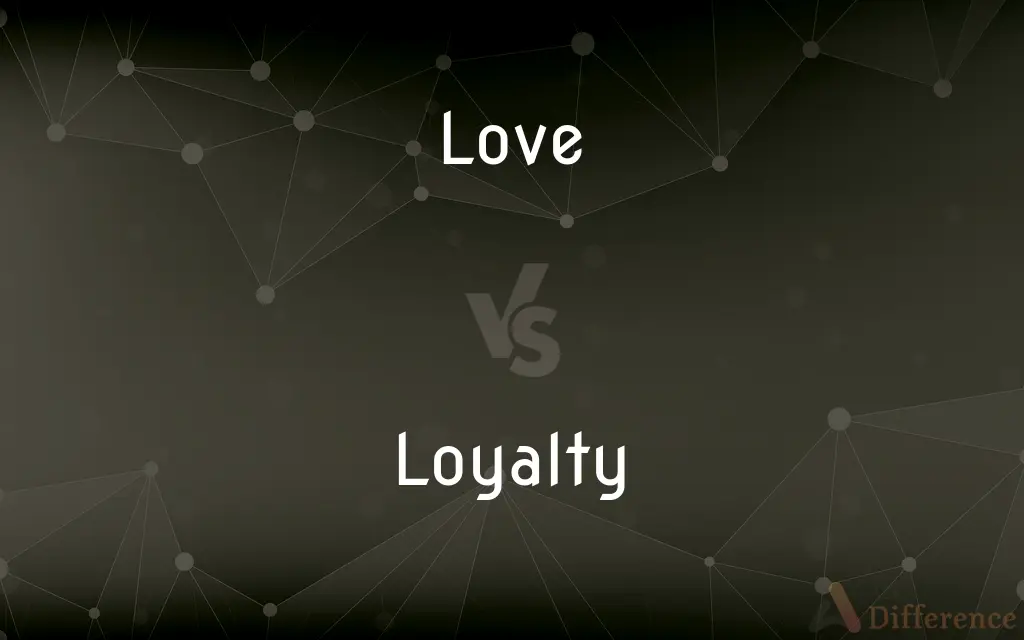Love vs. Loyalty — What's the Difference?
By Urooj Arif & Fiza Rafique — Updated on March 22, 2024
Love is an intense emotional affection towards someone, often unconditional and profound, while loyalty is a steadfast commitment or allegiance, typically based on choice and values.

Difference Between Love and Loyalty
Table of Contents
ADVERTISEMENT
Key Differences
Love encompasses deep, emotional bonds and affection towards another person, often characterized by a sense of attachment and care. On the other hand, loyalty refers to the quality of being faithful or devoted to someone or something, indicating a choice to stand by despite circumstances.
While love can manifest in various forms, including romantic, familial, and platonic, and is driven by emotional connections, loyalty is more about a consistent commitment or duty towards a person, organization, or cause, often grounded in principles or obligations.
Love often motivates loyalty, as individuals are typically more inclined to remain faithful to those they care deeply about. However, loyalty can exist independently of love, driven by duty, moral values, or contractual obligations, rather than emotional bonds.
In relationships, love is the foundation that fosters closeness, intimacy, and a deep connection, creating a sense of belonging and mutual care. Whereas loyalty in relationships manifests through actions that prove faithfulness and support, even in challenging times, underscoring reliability and trustworthiness.
The expression of love is multifaceted, involving gestures of affection, understanding, and emotional support, focusing on the well-being and happiness of the loved one. In contrast, loyalty can be expressed through consistency, dependability, and the refusal to betray trust or confidences, showcasing a commitment to integrity and ethical standards.
ADVERTISEMENT
Comparison Chart
Nature
Emotional, affectionate
Principle-based, commitment
Basis
Feelings, attachment
Decision, values
Manifestation
Affection, care, intimacy
Faithfulness, support, reliability
Dependency
Can be unconditional
Often conditional on principles/values
Expression
Gestures of affection, emotional support
Actions proving faithfulness
Compare with Definitions
Love
Deep affection for another person.
Her love for her children was evident in all she did.
Loyalty
Reliability in relationships.
They valued loyalty above all else in their friendship.
Love
A profound feeling of romantic attraction.
They fell in love at first sight.
Loyalty
Adherence to a promise or vow.
Their loyalty to each other was unbreakable.
Love
Caring deeply for friends or family.
His love for his friends knew no bounds.
Loyalty
Steadfast allegiance to a leader or cause.
Her loyalty to the movement inspired others.
Love
An intense liking for something.
She had a love for painting that filled her life with joy.
Loyalty
Faithfulness to commitments or obligations.
His loyalty to the company was recognized with an award.
Love
Unconditional emotional bond.
Their love remained strong through all challenges.
Loyalty
Firm adherence to a moral code.
His loyalty to his principles was admirable.
Love
A strong feeling of affection and concern toward another person, as that arising from kinship or close friendship.
Loyalty
Loyalty, in general use, is a devotion and faithfulness to a nation, cause, philosophy, country, group, or person. Philosophers disagree on what can be an object of loyalty, as some argue that loyalty is strictly interpersonal and only another human being can be the object of loyalty.
Love
Love encompasses a range of strong and positive emotional and mental states, from the most sublime virtue or good habit, the deepest interpersonal affection, to the simplest pleasure. An example of this range of meanings is that the love of a mother differs from the love of a spouse, which differs from the love of food.
Loyalty
The quality of being loyal
His extreme loyalty to the Crown
Love
A feeling of devotion or adoration toward God or a god.
Loyalty
The state or quality of being loyal.
Love
A feeling of kindness or concern by God or a god toward humans.
Loyalty
Often loyalties A feeling or attitude of devoted attachment and affection
My loyalties lie with my family.
Love
Often Love(Christianity) Charity.
Loyalty
The state of being loyal; fidelity.
Brand loyalty
Love
An instance of being in love
Teenage loves can be as fleeting as they are intense.
Loyalty
Faithfulness or devotion to some person, cause or nation.
He showed loyalty to his local football club after successive relegations.
Love
A person for whom one has strong feelings of affection
She met her new love at the restaurant.
Loyalty
The state or quality of being loyal; fidelity to a superior, or to duty, love, etc.
He had such loyalty to the king as the law required.
Not withstanding all the subtle baitWith which those Amazons his love still craved,To his one love his loyalty he saved.
Love
Used as a term of endearment for such a person.
Loyalty
The quality of being loyal
Love
An intense emotional attachment to something, as to a pet or treasured object.
Loyalty
Feelings of allegiance
Love
An expression of one's affection
Send him my love.
Loyalty
The act of binding yourself (intellectually or emotionally) to a course of action;
His long commitment to public service
They felt no loyalty to a losing team
Love
A strong predilection or enthusiasm
A love of language.
Love for the game of golf.
Love
The object of such an enthusiasm
The outdoors is her greatest love.
Love
Love(Mythology) Eros or Cupid.
Love
(Sports) A score of zero, as in tennis.
Love
To feel love for (a person)
We love our parents. I love my friends.
Love
To feel devotion to (God or a god).
Love
To feel or show kindness or concern to (a person). Used of God or a god.
Love
To have an intense emotional attachment to
Loves his house.
Love
To embrace or caress
They were loving each other on the sofa.
Love
To like or desire enthusiastically
Loves swimming.
Love
To thrive on; need
The cactus loves hot, dry air.
Love
(uncountable) A deep caring for the existence of another.
Love
(uncountable) Strong affection.
Love
A profound and caring affection towards someone.
A mother’s love is not easily shaken.
My husband’s love is the most important thing in my life.
Love
Affectionate, benevolent concern or care for other people or beings, and for their well-being.
Love
A feeling of intense attraction towards someone.
I have never been in love as much as I have with you.
Love
A deep or abiding liking for something; an enthusiasm for something.
My love of cricket knows no bounds.
Love
(countable) A person who is the object of romantic feelings; a darling, a sweetheart, a beloved.
Love
A term of friendly address, regardless of feelings.
Hello love, how can I help you?
Love
A thing, activity, etc. which is the object of one's deep liking or enthusiasm.
Love
An instance or episode of being in love; a love affair.
Love
Used as the closing, before the signature, of a letter, especially between good friends or family members, or by the young.
Love
(obsolete) A thin silk material.
Love
A climbing plant, Clematis vitalba.
Love
Zero, no score.
So that’s fifteen-love to Kournikova.
Love
Nothing; no recompense.
Love
To have a strong affection for (someone or something).
I love my spouse.
I love you!
I love that song!
Love
(transitive) To need, thrive on.
Mold loves moist, dark places.
Love
(transitive) To be strongly inclined towards something; an emphatic form of like.
I love walking barefoot on wet grass;
I'd love to join the team;
I love what you've done with your hair
Love
To care deeply about, to be dedicated to (someone or something).
Love
(transitive) To derive delight from a fact or situation.
I love the fact that the coffee shop now offers fat-free chai latte.
Love
A feeling of strong attachment induced by that which delights or commands admiration; preëminent kindness or devotion to another; affection; tenderness; as, the love of brothers and sisters.
Of all the dearest bonds we proveThou countest sons' and mothers' loveMost sacred, most Thine own.
Love
Courtship; - chiefly in the phrase to make love, i. e., to court, to woo, to solicit union in marriage.
Demetrius . . . Made love to Nedar's daughter, Helena,And won her soul.
Love
Due gratitude and reverence to God.
Keep yourselves in the love of God.
Love
The object of affection; - often employed in endearing address; as, he held his love in his arms; his greatest love was reading.
Open the temple gates unto my love.
Love
Cupid, the god of love; sometimes, Venus.
Such was his form as painters, when they showTheir utmost art, on naked Lores bestow.
Therefore do nimble-pinioned doves draw Love.
Love
A thin silk stuff.
Love
A climbing species of Clematis (Clematis Vitalba).
Love
Nothing; no points scored on one side; - used in counting score at tennis, etc.
He won the match by three sets to love.
Love
To have a feeling of love for; to regard with affection or good will; as, to love one's children and friends; to love one's country; to love one's God.
Thou shalt love the Lord thy God with all thy heart, and with all thy soul, and with all thy mind.
Thou shalt love thy neighbor as thy self.
Love
To take delight or pleasure in; to have a strong liking or desire for, or interest in; to be pleased with; to like; as, to love books; to love adventures.
Wit, eloquence, and poetry.Arts which I loved.
Love
To have the feeling of love; to be in love.
Love
A strong positive emotion of regard and affection;
His love for his work
Children need a lot of love
Love
Any object of warm affection or devotion;
The theater was her first love
He has a passion for cock fighting
Love
A beloved person; used as terms of endearment
Love
A score of zero in tennis or squash;
It was 40 love
Love
Have a great affection or liking for;
I love French food
She loves her boss and works hard for him
Love
Get pleasure from;
I love cooking
Love
Be enamored or in love with;
She loves her husband deeply
Common Curiosities
Is loyalty more important than love?
The importance of love versus loyalty varies by individual values and context; both play crucial roles in different aspects of relationships.
Can love exist without loyalty?
While love can inspire loyalty, it's possible to love without being loyal, especially in cases of emotional conflict or personal struggles.
What role does trust play in love and loyalty?
Trust is fundamental to both love and loyalty; it strengthens emotional bonds and affirms commitments.
In what ways can love and loyalty conflict?
Love and loyalty may conflict when personal feelings diverge from obligations or when loyalty to one person or group challenges love for another.
What is the essence of love?
Love is an intense emotional affection towards someone, often characterized by a deep bond and caring.
How is loyalty defined?
Loyalty is a steadfast commitment or faithfulness to someone or something, based on principles or choice.
How do love and loyalty interact in relationships?
In healthy relationships, love often fosters loyalty, creating a bond that is both emotionally fulfilling and committed.
What motivates loyalty in the absence of love?
Loyalty can be motivated by duty, moral values, societal norms, or contractual obligations, independent of emotional affection.
Can loyalty be considered a form of love?
Loyalty can be seen as an expression of love, especially when it involves choosing to stand by someone through challenges.
How do cultural perspectives influence the view of love and loyalty?
Cultural perspectives can significantly shape how love and loyalty are perceived, valued, and expressed, reflecting societal norms and values.
How are love and loyalty expressed differently?
Love is expressed through affection and emotional support, while loyalty is shown through consistency, reliability, and support.
How are love and loyalty navigated in modern relationships?
In modern relationships, navigating love and loyalty involves communication, compromise, and prioritizing mutual respect and understanding.
How do love and loyalty contribute to personal well-being?
Both love and loyalty contribute to personal well-being by providing emotional support, a sense of belonging, and stability.
Can loyalty lead to love?
Loyalty can sometimes lead to love, as the commitment and reliability demonstrated can deepen emotional connections.
Are love and loyalty universal experiences?
While the concepts of love and loyalty are universal, their expressions and interpretations vary widely across different cultures and individuals.
Share Your Discovery

Previous Comparison
Clarifying vs. Purifying
Next Comparison
Candy vs. SweetsAuthor Spotlight
Written by
Urooj ArifUrooj is a skilled content writer at Ask Difference, known for her exceptional ability to simplify complex topics into engaging and informative content. With a passion for research and a flair for clear, concise writing, she consistently delivers articles that resonate with our diverse audience.
Co-written by
Fiza RafiqueFiza Rafique is a skilled content writer at AskDifference.com, where she meticulously refines and enhances written pieces. Drawing from her vast editorial expertise, Fiza ensures clarity, accuracy, and precision in every article. Passionate about language, she continually seeks to elevate the quality of content for readers worldwide.
















































